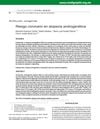4 citations,
May 2021 in “Research Journal of Science and Technology” Hibiscus rosa sinensis shows promise for treating various health conditions and promoting hair growth.
[object Object]  3 citations,
March 2023 in “Life”
3 citations,
March 2023 in “Life” Obesity can worsen wound healing by negatively affecting the function of stem cells in fat tissue.

Older people tend to have higher biotin levels, which are weakly linked to certain blood components and negatively linked to triglycerides; biotin should be checked in patients with high triglycerides or medication-related skin issues, and only supplemented if deficient. Vitamin D and folate deficiencies are linked to specific skin conditions.
 April 2023 in “Clinical Chemistry and Laboratory Medicine”
April 2023 in “Clinical Chemistry and Laboratory Medicine” The document concludes that inflammation markers can be used in diabetes, vitamin D3 affects immune pathways, hyperthyroidism changes hormone levels, androgen levels help diagnose Adrenocortical Carcinoma, erectile dysfunction is linked to diabetes, hypogonadism is common in HIV-infected males, and hormones can be biomarkers for various conditions.
 April 2022 in “Anti-cancer agents in medicinal chemistry”
April 2022 in “Anti-cancer agents in medicinal chemistry” Some existing medicines show promise as safe treatments to protect against the side effects of radiation therapy.
 8 citations,
May 1998 in “Journal of Oral and Maxillofacial Surgery”
8 citations,
May 1998 in “Journal of Oral and Maxillofacial Surgery” Acne is caused by increased sebum, abnormal skin shedding, bacteria, and inflammation, not dirt; treatments vary from creams to antibiotics or isotretinoin, with severe cases needing a dermatologist's care.
 29 citations,
January 2011 in “Journal of Obstetrics and Gynaecology”
29 citations,
January 2011 in “Journal of Obstetrics and Gynaecology” Insulin resistance in women with PCOS can lead to serious health issues, but lifestyle changes and certain medications can help manage symptoms.
 22 citations,
January 2013 in “Journal of The American Academy of Dermatology”
22 citations,
January 2013 in “Journal of The American Academy of Dermatology” Birth control pills can help manage acne, but dermatologists should know their skin-related side effects, especially when prescribing drugs that can harm unborn babies.
 991 citations,
January 2011 in “Nature Reviews Endocrinology”
991 citations,
January 2011 in “Nature Reviews Endocrinology” The document concludes that PCOS is a complex disorder caused by both genetic and environmental factors, affecting women's health in various ways, and requires personalized treatment.
 22 citations,
October 2020 in “Anais Brasileiros de Dermatologia”
22 citations,
October 2020 in “Anais Brasileiros de Dermatologia” The Brazilian Society of Dermatology agrees that oral isotretinoin is effective for acne and other skin conditions, and it's safe when monitored, but more research is needed on dosing and duration.
 21 citations,
June 1990 in “British Journal of Dermatology”
21 citations,
June 1990 in “British Journal of Dermatology” Systemic retinoids are effective for psoriasis but have side effects; benefits may outweigh risks, especially when reducing cancer risks from other treatments.
 14 citations,
September 2017 in “Clinics in Dermatology”
14 citations,
September 2017 in “Clinics in Dermatology” Skin diseases linked to insulin resistance should be managed to prevent diabetes and reduce heart disease risk.
 9 citations,
July 2009 in “Journal Of Endocrinology, Metabolism And Diabetes Of South Africa”
9 citations,
July 2009 in “Journal Of Endocrinology, Metabolism And Diabetes Of South Africa” The document concludes that managing PCOS involves treating symptoms and reducing long-term metabolic risks, with lifestyle changes being important.
[object Object]  4 citations,
November 2012 in “Obstetrics, Gynaecology & Reproductive Medicine”
4 citations,
November 2012 in “Obstetrics, Gynaecology & Reproductive Medicine” Lifestyle changes and clomiphene are first-line treatments for infertility in women with PCOS, with other options available if these fail.
 2 citations,
April 2020 in “bioRxiv (Cold Spring Harbor Laboratory)”
2 citations,
April 2020 in “bioRxiv (Cold Spring Harbor Laboratory)” MendelVar is a tool that helps identify important genes by combining GWAS data with Mendelian disease information.
 2 citations,
January 2013 in “Elsevier eBooks”
2 citations,
January 2013 in “Elsevier eBooks” The document explains the genetic causes and characteristics of inherited hair disorders.

research Acne
2 citations,
May 2011 in “Harper's Textbook of Pediatric Dermatology” Acne is a common skin condition linked to diet, hormones, and genetics, and early treatment can prevent scarring.
 1 citations,
January 2010 in “Elsevier eBooks”
1 citations,
January 2010 in “Elsevier eBooks” Any drug can cause skin reactions, but antibiotics, NSAIDs, and psychotropic drugs are more common, with some reactions being life-threatening.

Losing weight and eating better are key to managing metabolic syndrome and its related conditions.

The document concludes that Syndromes of Severe Insulin Resistance are rare disorders with limited treatment options.
 August 1994 in “Drugs & Therapy Perspectives”
August 1994 in “Drugs & Therapy Perspectives” Psoriasis treatments range from topical creams to systemic medications with serious side effects, and while treatments can manage symptoms, there is no cure.
 2 citations,
September 2015 in “Clínica e Investigación en Arteriosclerosis”
2 citations,
September 2015 in “Clínica e Investigación en Arteriosclerosis” Some skin conditions may increase the risk of heart disease, but are not yet included in cardiovascular prevention guidelines.
 2 citations,
March 2011 in “Infertility”
2 citations,
March 2011 in “Infertility” The conclusion is that lifestyle changes and weight loss are first-line treatments for infertility due to anovulation, with various medications and assisted reproductive technologies as additional options.
 1 citations,
April 2022 in “Emergency Medicine Australasia”
1 citations,
April 2022 in “Emergency Medicine Australasia” The document concludes that respectful, gender-affirming healthcare improves mental health and encourages continued medical care for transgender and non-binary individuals.
 September 2023 in “Fides et Ratio”
September 2023 in “Fides et Ratio” The safety and effectiveness of gender-affirming treatments for children are uncertain, with potential long-term risks like infertility.
 January 2014 in “Revista del Centro Dermatológico Pascua”
January 2014 in “Revista del Centro Dermatológico Pascua” Male pattern baldness is not a risk factor for heart disease based on cholesterol levels alone.
 295 citations,
January 2006 in “Journal of the American Academy of Dermatology”
295 citations,
January 2006 in “Journal of the American Academy of Dermatology” Alopecia areata, a common autoimmune hair loss condition, often runs in families.
 38 citations,
March 2010 in “Medicine”
38 citations,
March 2010 in “Medicine” Most patients with Porphyria Cutanea Tarda had skin blisters and were often affected by hepatitis C and alcohol abuse, with differences between familial and sporadic cases.
 33 citations,
January 2015 in “Journal of Cosmetic Dermatology”
33 citations,
January 2015 in “Journal of Cosmetic Dermatology” Familial frontal fibrosing alopecia affects premenopausal women too, and early diagnosis is important, but no proven medication exists yet.
 30 citations,
May 2005 in “Pediatric dermatology”
30 citations,
May 2005 in “Pediatric dermatology” Some families have a genetic condition where they are born with irregular scalp defects.




























